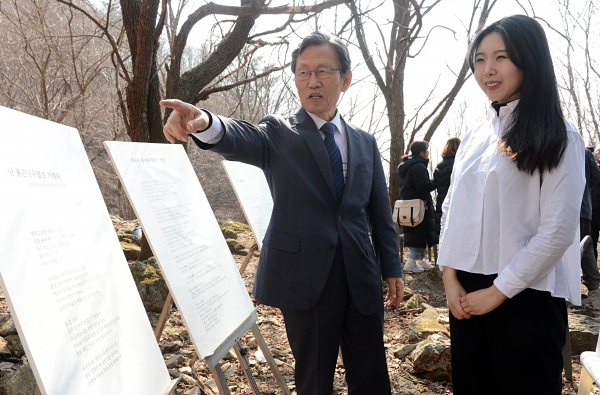Throughout my life's journey, I've rarely found myself in situations where I had to struggle desperately. This doesn't mean my life has been devoid of effort. Rather, I've lived by seizing opportunities when they presented themselves.
During my military service, I certainly faced challenges, particularly with physically demanding training. This experience taught me perseverance and tenacity. However, in the years that followed, I chose to focus on finding and pursuing what truly mattered to me, rather than frantically chasing after things.
My doctoral dissertation exemplifies this approach. While studying alongside students from various countries, our professor proposed a topic on "The Throne of God." Initially, a student from Yugoslavia took on the subject, but when I heard he had given up, I didn't hesitate to seize the opportunity. "I'll take it on," I said, and when the professor sought confirmation, I reiterated, "I'll do it."
This research became the subject of my doctoral thesis, taking three years to complete. While I wouldn't say I approached it with desperate intensity, it was undoubtedly the most time-consuming and effort-intensive project of my life. It wasn't merely about obtaining a degree; it was a culmination of my academic passion and beliefs.
Through experiences like these, I've come to realize that what's truly important in life isn't winning competitions against others, but finding what you genuinely desire and dedicating yourself to it. Opportunities may not always be immediately apparent, but when they do arise, it's crucial to grasp them firmly.
My life hasn't been a series of dramatic struggles. Instead, I've consistently given my best in every moment, cherishing the opportunities presented to me and growing through them. This approach has profoundly influenced my academic journey and life as a theologian.
When exploring new theological concepts or challenging existing theories, I maintained this attitude. Rather than seeking immediate results or recognition, I focused on conducting in-depth research and gaining genuine insights. While this process might have been slower at times, it ultimately contributed to more solid and meaningful academic achievements.
This approach also proved invaluable in my life as a pastor. In leading church communities and caring for congregants, I focused on respecting and supporting each individual's spiritual growth process rather than demanding immediate changes or results. This proved effective in fostering deeper and more lasting transformations in faith.
In essence, my way of living has been based on consistency, authenticity, and the ability to seize opportunities, rather than dramatic struggles or extreme efforts. This life attitude has been consistently applied across my academic work, faith, and pastoral activities, forming the foundation of all I've accomplished. Moving forward, I will continue to live this way, cherishing every opportunity given to me and making the most of it.
During my military service, I certainly faced challenges, particularly with physically demanding training. This experience taught me perseverance and tenacity. However, in the years that followed, I chose to focus on finding and pursuing what truly mattered to me, rather than frantically chasing after things.
My doctoral dissertation exemplifies this approach. While studying alongside students from various countries, our professor proposed a topic on "The Throne of God." Initially, a student from Yugoslavia took on the subject, but when I heard he had given up, I didn't hesitate to seize the opportunity. "I'll take it on," I said, and when the professor sought confirmation, I reiterated, "I'll do it."
This research became the subject of my doctoral thesis, taking three years to complete. While I wouldn't say I approached it with desperate intensity, it was undoubtedly the most time-consuming and effort-intensive project of my life. It wasn't merely about obtaining a degree; it was a culmination of my academic passion and beliefs.
Through experiences like these, I've come to realize that what's truly important in life isn't winning competitions against others, but finding what you genuinely desire and dedicating yourself to it. Opportunities may not always be immediately apparent, but when they do arise, it's crucial to grasp them firmly.
My life hasn't been a series of dramatic struggles. Instead, I've consistently given my best in every moment, cherishing the opportunities presented to me and growing through them. This approach has profoundly influenced my academic journey and life as a theologian.
When exploring new theological concepts or challenging existing theories, I maintained this attitude. Rather than seeking immediate results or recognition, I focused on conducting in-depth research and gaining genuine insights. While this process might have been slower at times, it ultimately contributed to more solid and meaningful academic achievements.
This approach also proved invaluable in my life as a pastor. In leading church communities and caring for congregants, I focused on respecting and supporting each individual's spiritual growth process rather than demanding immediate changes or results. This proved effective in fostering deeper and more lasting transformations in faith.
In essence, my way of living has been based on consistency, authenticity, and the ability to seize opportunities, rather than dramatic struggles or extreme efforts. This life attitude has been consistently applied across my academic work, faith, and pastoral activities, forming the foundation of all I've accomplished. Moving forward, I will continue to live this way, cherishing every opportunity given to me and making the most of it.

